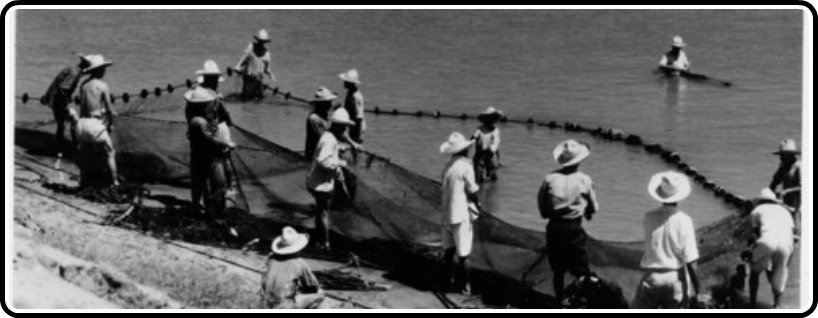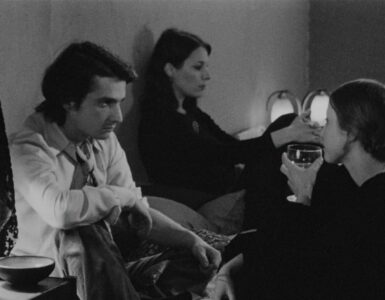While most things birthed out of a government commission, at least cinematically, are not much above the realm of the classic newsreels one would see decades ago cropping up before any respective screening or the educational pictures you’d watch dreading watching when you walked into any respective class in school, sometimes a picture can truly break that mold. Sometimes, a film can take be sparked by a nation on the brink, and not only become a powerful political and social statement, but also a massively influential and important piece of cinema.
That’s the territory the long-thought-to-be-lost neo-realist propaganda picture Redes plays in. Initially conceived as a documentary by legendary photographer Paul Strand, the film was originally intended as a part of the Mexican composer Carlos Chavez’s attempt to further promote the arts in his native Mexico. However, when the production began to falter, the pair of Henwar Rodakiewicz and filmmaker Fred Zinnemann joined forces with co-director Emilio Gomez Muriel to turn this intended documentary into a piece of startling fiction. Strand and Agustin Chavez, Carlos’ nephew, formed the original scenario, and with the aforementioned trio’s involvement, the film was formed into what is best described as a precursor to a movement like Italian neo-realism, and yet, something entirely its own.
The film tells the story of a fishing community in Alvarado, where fishermen fight to make as much money as the physically can. Paid a pittance for their work, these fishermen band together to revolt against their bosses after one of the workers, Miro, loses his son because he can’t afford medical care for the young boy. Exploited by their bosses, Miro becomes radicalized following his son’s death, ultimately leading his fellow workers in their revolt only to find his own ending, which itself, as posited by the final shot, inspires an even greater and stronger revolution. A deeply affecting film given its hour long runtime, this startling piece of faux-documentary filmmaking is a wonderfully entrancing blend of neo-realism and social commentary seemingly ripped out of early Soviet cinema.
While the film itself is an affecting bit of social commentary, the means, aesthetically, with which it brings the viewer its message is utterly engrossing. Again, deeply inspired by early documentary films and Soviet propaganda pictures, the film’s blend of the faux documentary storytelling and Eisenstein-esque experimentation turns this into a film experience unlike any you’ve ever seen. The black and white photography from Strand here is absolutely gorgeous, and really pops off the screen thanks to Criterion’s new and impressive restoration of the film. The camera work here is ripped right out of the Eisenstein playbook, camera angles and all, with the editing almost cartoonishly inspired by early Soviet work.
With a cast of primarily non-actors, the performances here feel a tad off, but the film is intense and emotionally resonant, the only real acting artifice coming in some of the readings of these non-actors. The plot itself is linear and relatively standard, but that doesn’t make the intense political and social commentary any less powerful. A powerful and unforgettable meditation on a nation on the brink of complete and social revolution, the film not only inspired entire filmmaking movements, but is a breathless look at a moment in a nation’s history that became as influential and important in that nation’s history as any point. Zinnemann, seen already in The Criterion Collection thanks to his work on the equally enchanting People On Sunday, is at the top of his game here, blending this powerful thematic resonance with a haunting use of his camera and his frame to bring to live this vital story of social and political revolution.
Criterion’s restoration of the film joins Touki Bouki as the first two films seen in their new World Cinema Project box set (both films featured on one Blu-ray and separate DVDs), and comes with an introduction from Martin Scorsese, as well as a really interesting visual essay from critic Kent Jones. The transfer here is fantastic, with the score from Silvestre Revueltas coming to vibrant life. A film long thought lost to history, this may be one of the most interesting finds held within this cavalcade of forgotten or lost world cinema masterpieces.






![Bergman Island (The Criterion Collection) [Blu-ray]](https://criterioncast.com/wp-content/uploads/2022/11/bergman-island-the-criterion-collection-blu-ray-400x496.jpg)
![This Is Not a Burial, It’s a Resurrection (The Criterion Collection) [Blu-ray]](https://criterioncast.com/wp-content/uploads/2022/11/this-is-not-a-burial-its-a-resurrection-the-criterion-collection-blu-ray-400x496.jpg)
![Lars von Trier's Europe Trilogy (The Criterion Collection) [The Element of Crime/Epidemic/Europa] [Blu-ray]](https://criterioncast.com/wp-content/uploads/2022/11/lars-von-triers-europe-trilogy-the-criterion-collection-the-element-of-400x496.jpg)
![Imitation of Life (The Criterion Collection) [Blu-ray]](https://criterioncast.com/wp-content/uploads/2022/11/imitation-of-life-the-criterion-collection-blu-ray-400x496.jpg)
![The Adventures of Baron Munchausen (The Criterion Collection) [4K UHD]](https://criterioncast.com/wp-content/uploads/2022/11/the-adventures-of-baron-munchausen-the-criterion-collection-4k-uhd-400x496.jpg)
![Cooley High [Criterion Collection] [Blu-ray] [1975]](https://criterioncast.com/wp-content/uploads/2022/11/cooley-high-criterion-collection-blu-ray-1975-400x496.jpg)